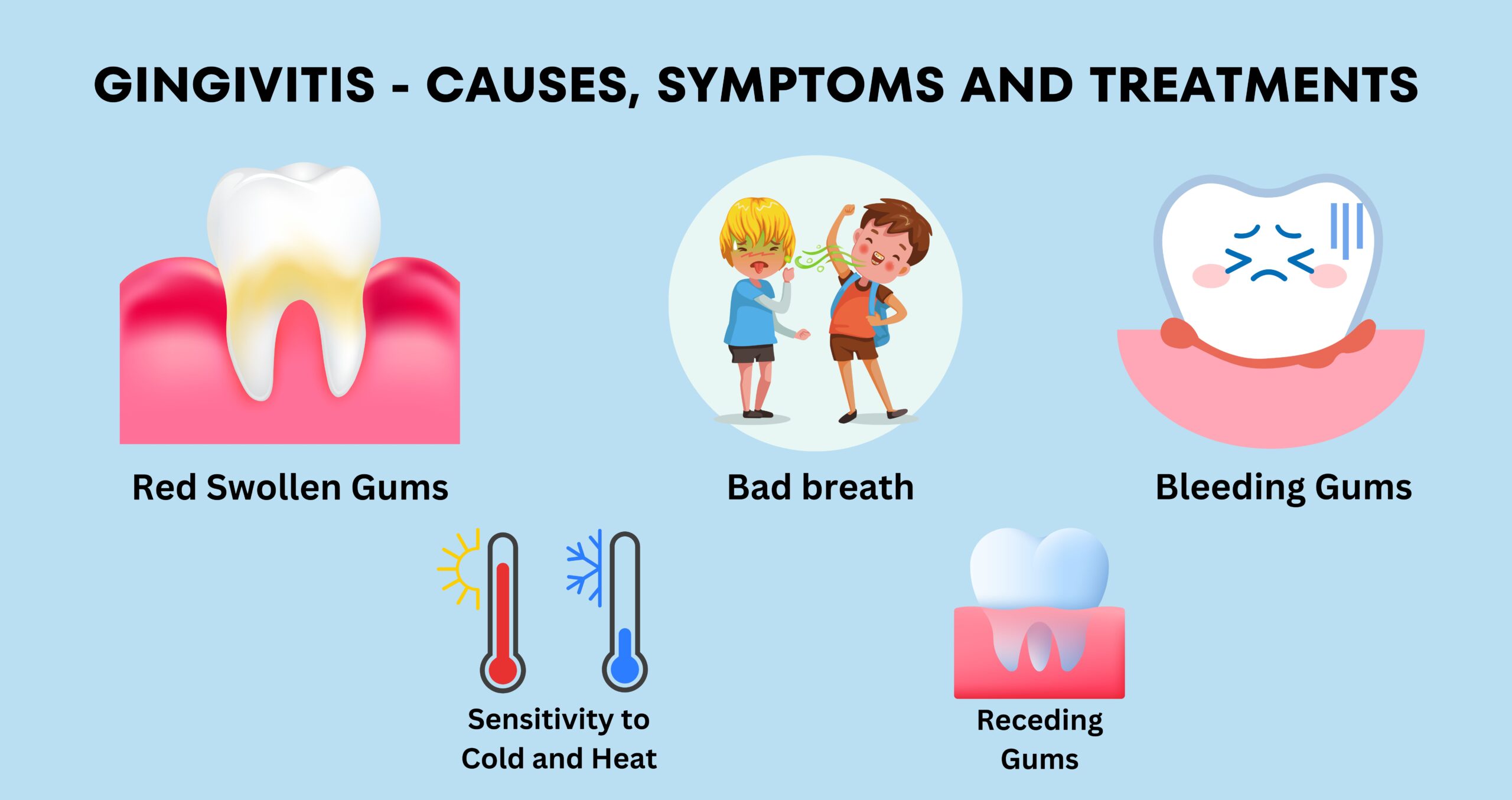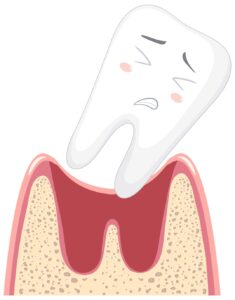
The connection between oral health and overall health has always been a topic for debate. Gum diseases, especially, are being linked to conditions related to the formation of blood clots, heart attacks and stroke. While people today are more aware of dental diseases like cavities and the need to prevent them, many of us are still in the dark about gum diseases such as gingivitis. As per NIH Medline Plus Magazine, around 42% of adults worldwide have some form of gum disease like Gingivitis. Presently, the common tendency among most people is to ignore gum disease symptoms like bleeding and postpone dental checkups till they become severe. As an effort to raise awareness about gum diseases, this article explores what is gingivitis, early signs of gingivitis and how to treat them, the Gingivitis vs periodontitis relation, and possible Gingivitis Causes Symptoms and Treatments.
Understanding Gingivitis Causes Symptoms and Treatments
Gingivitis is a mild but common form of gum disease caused by plaque buildup on your teeth. Plaque, a sticky layer of bacteria, food particles, and mucus, forms naturally and can lead to tooth decay if not removed. Over time, if plaque build-up on gums isn’t cleaned away, it hardens into tartar, which irritates the gums and causes swelling and tenderness. This irritation triggers inflammation as the body tries to fight off harmful bacteria.
Signs of Gingivitis:
- Persistent bad breath, even after brushing.

- Gums that bleed easily, especially while brushing.
- Red or swollen gums.
- Sensitivity to hot or cold foods.
- Pain or tenderness when chewing.
Identifying gingivitis and signs of gum disease early, understanding gingivitis causes, and maintaining good oral hygiene can prevent it from worsening. Regular dental checkups and professional cleanings are also key to keeping your gums healthy and fostering Gingivits prevention.
Gingivitis Causes Symptoms and Treatments
Gingivitis often develops due to inadequate care of teeth and gums, allowing plaque to accumulate and irritate the surrounding gum tissues. Other factors that are the causes of gum inflammation include:
- Dry Mouth: Reduced saliva can lead to plaque buildup.
- Poor Nutrition: A diet lacking essential nutrients, especially vitamin C, weakens gum.
- Dental Work Issues: Improperly fitted fillings, bridges, or implants can create hard-to-clean areas.
- Crooked Teeth: Misaligned teeth can make thorough cleaning challenging.
- Weakened Immunity: Conditions like HIV/AIDS, leukemia, or cancer treatment can increase vulnerability.
- Certain Medications: Some drugs, such as those for seizures or high blood pressure, can affect gum health.

- Hormonal Changes: Pregnancy, menstruation, or birth control pills may trigger gum sensitivity.
- Smoking: It weakens the immune system and makes it hard to fight off infections.
- Uncontrolled diabetes: When not in control, diabetes can lead to high blood sugar levels in mouth fluids, promoting the growth of bacteria that cause gum disease.
- Genetics: If you have a family history of gum disease.
Addressing these risk factors and maintaining good oral hygiene can help prevent gingivitis. However, if you already have symptoms of early gum disease, consult your dentist for gingivitis treatments.
Complications of Gingivitis Causes Symptoms and Treatments
If gingivitis is not treated, it can progress to a more severe form of gum disease called periodontitis. Periodontitis can cause the following complications:
- Tooth Abscess: Bacterial infection can form around the tooth, leading to painful abscesses.
- Receding Gums: The gums may start to pull away from the teeth, exposing the roots and increasing sensitivity.
- Tooth Loss: Severe gum disease can damage the tissues and bones that support your teeth, leading to tooth loss.

Proper oral care and early gingivitis treatments after noticing Gingivitis symptoms can prevent these serious complications from occurring.
Gingivitis vs. Periodontitis
A lot of people do not know the differences between gingivitis and periodontitis. Gingivitis is a mild form, while periodontitis is a severe stage that can cause serious problems if not treated properly.
Here are the four gingivitis stages you should know about:
- Gingivitis: It’s the first phase, where the gums become red and swollen and may even bleed on contact with a toothbrush. It is not associated with bone loss at this stage and is fully reversible if treated appropriately.
- Mild Periodontitis: Bacteria grow below the gum line and affect the bone. Some gum loss can occur, and the gums could start to recede and leave space between the teeth and the gum line, which becomes difficult to clean.
- Moderate Periodontitis: The bacteria erode the ligaments, soft tissues, and bones that hold your teeth in place. Soreness, infection, and foul smell of the breath may be experienced.
- Advanced Periodontitis: Bone loss continues, and the teeth become loose and may eventually fall out.
Early gingivitis treatments can help avoid the development of periodontitis.
Diagnostic Techniques for Gingivitis
Dentists diagnose gingivitis using the following methods:
- Physical Examination: Examining your mouth for any signs of bleeding, swelling, loose teeth, gums that are pulling away from the teeth or any irritation.
- Medical and Dental History: Reviewing your health history to identify conditions that might be causing the symptoms.
- Measuring Gum Pockets: Inserting a dental probe to check the distance between the teeth and the gums. Pockets that are healthy are 1–3 mm in depth, while those that are deeper may be an indication of gum disease.
- Dental X-rays: Using X-rays to identify bones that have been affected in areas with deeper gum pockets.
- Additional Tests: If the cause of gingivitis is unknown, your dentist may suggest additional tests or may refer you to a periodontist, a dentist who specializes in gum disease and Gingivitis Causes Symptoms and Treatments.
Treatment for Gingivitis
Gingivitis treatments centre on controlling the disease and repairing the tissues in the gums. Your dentist will scale your teeth to remove the plaque, tartar and other bacteria. Common treatments include:
- Scaling and Root Planing: This thorough cleaning process scrapes off the tartar and bacteria just below the gum line (scaling) and also makes the tooth roots as smooth as possible to discourage bacteria from returning (planing).
- Better Oral Hygiene: A professional cleaning usually clears up gingivitis, but it’s important to keep up good hygiene at home. Your dentist will advise you on how to brush and floss and when to come for your next dental check-up.
- Antimicrobial Mouthwash: A mouthwash can be effective in eradicating bacteria and decreasing inflammation.
- Surgery if it advances to periodontitis: If gingivitis leads to periodontitis, then laser flap surgery may be required to treat the disease if other treatments such as root planing, gum prophylaxis or antibiotics are not effective.
Gingivitis Causes Symptoms and Treatments
You can lower your chances of getting gingivitis by following simple oral care habits:
- Keep your sugar levels in control.
- Cut down on sugary foods, drinks, and alcohol.
- Do not smoke or use any tobacco products.
- Make flossing a daily habit to ensure that you remove the food that hides between your teeth.
- Clean your teeth in the morning and before going to bed at night.
- Have more foods that contain vitamin C since it fights inflammation.
- Visit your dentist regularly—at least once a year, or more often if you notice any gum problems and get dental cleanings.
Consistent care goes a long way in keeping your gums healthy and preventing issues like gingivitis. Remember that home remedies for gingivitis are only a temporary solution. If your symptoms persist, don’t hesitate to visit an experienced dentist who specializes in gum issues and knows how to treat gingivitis effectively. Your dentist will suggest the best toothpaste for gingivitis and the most suitable gingivitis treatments based on the progress of your gum disease.
Conclusion
You are now well-versed about the impact of oral hygiene and gum health on your overall health and how early Gingivitis Causes Symptoms and Treatments can prevent complications like tooth loss or receding gums. Dentist treatment for gingivitis is always better than trying remedies at home. So, If you have gingivitis symptoms, visit a reputed gun disease specialist like Gnathos Dental, who will evaluate your condition and suggest options like Professional gingivitis cleaning options and Gum care tips for gingivitis prevention.
At Gnathos Dentall, we follow the best practices in terms of hygiene and use the most advanced techniques and ADA-approved materials for treatment to ensure the best outcomes with zero complications. If you suffer from gum problems, meet our team to get personalized treatments and compassionate care at our state-of-the-art dental facility
FAQs
1.How does gingivitis develop?
Gingivitis starts when plaque and tartar build up on teeth, leading to gum irritation, redness, and swelling.
2.Is gingivitis reversible?
Yes, early-stage gingivitis is treatable with proper dental care, lifestyle changes, and following your dentist’s advice.
3.Gingivitis Causes Symptoms and Treatments cause bad breath?
Yes, gingivitis can cause bad breath because of the bacteria buildup in your mouth and the infection in your gums. This bacteria produces foul-smelling compounds, and the inflammation can trap food particles, further contributing to unpleasant odors.
4.Which is the best mouthwash for gingivitis prevention?
An antimicrobial mouthwash is best, as it helps reduce bacteria and prevent gum disease. Always consult your dentist for recommendations.
5.How to cure gingivitis naturally?
You can prevent gingivitis to a large extent by maintaining oral hygiene. However, Gingivitis treatment at home is not a permanent solution. So, getting regular dental checkups and cleanings to remove plaque is a must.
